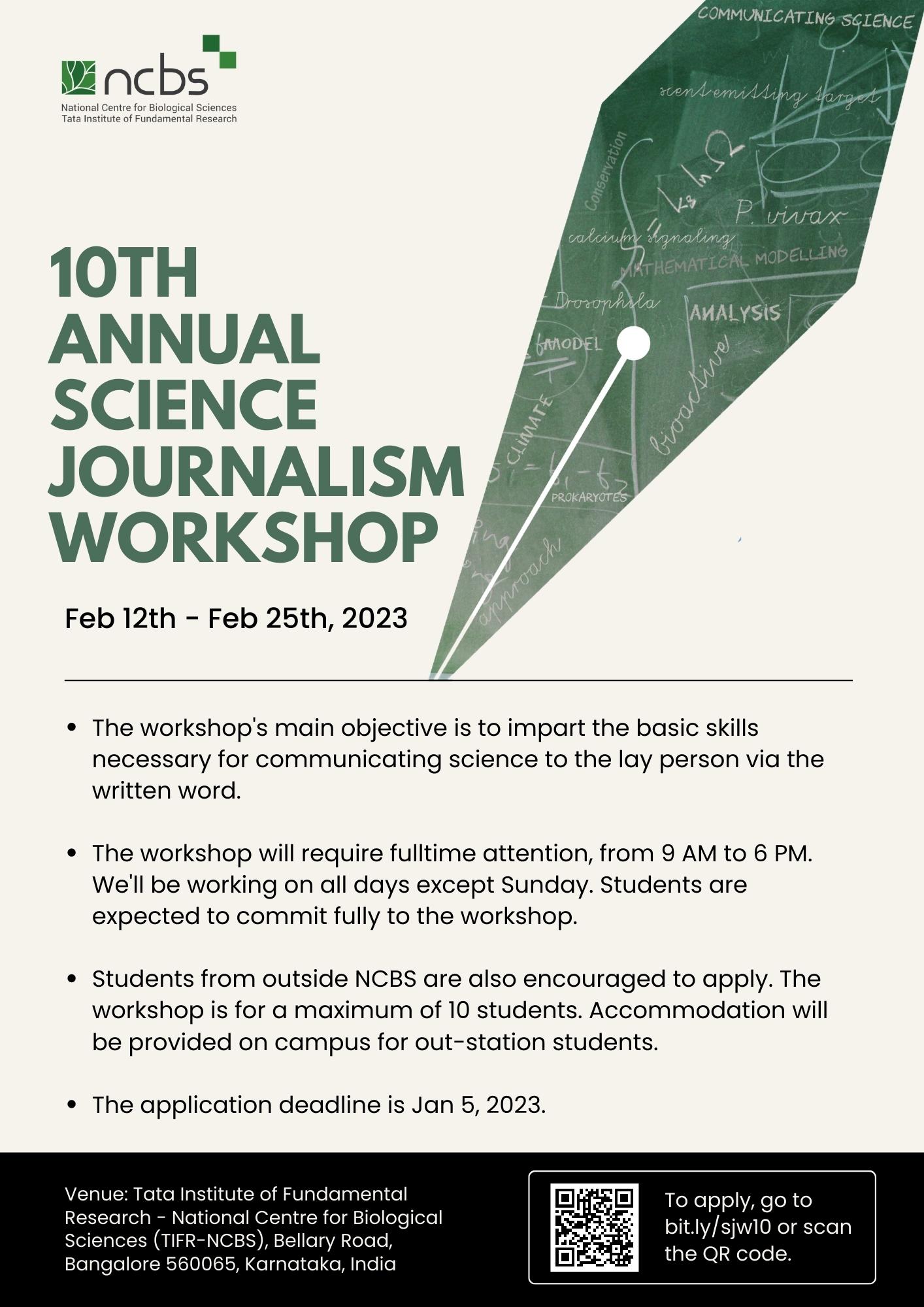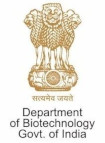Journalism Workshop
NCBS announces its 10th Annual Science Journalism Workshop, which will be held on campus from Feb 12th to Feb 25th, 2023.
The workshop’s main objective is to impart the basic skills necessary for communicating science to the lay person via the written word.
Students will learn the elements of good science writing and the art and craft of conducting effective interviews. The workshop will focus on news and features, two forms of writing that can form the foundation for a career in communicating science to the lay person. Popular science writing and journalism isn’t merely about summarising an academic paper. Rather, it strives to entertain and educate, provide multiple points-of-view, and at its best be an independent and necessary part of a thriving culture of scientific enquiry.
The workshop will demand active and committed participation from students. They will have to interview scientists, write news and feature stories, which will be edited in-class by the instructors. A firm grounding in science and/or technology is mandatory as is a facility with language.
The workshop will require fulltime attention, from 9 AM to 6 PM. We’ll be working on all days except Sunday. Students are expected to commit fully to the workshop.
Students from outside NCBS are also encouraged to apply. The workshop is for a maximum of 10 students. Accommodation will be provided on campus for out-station students.
If you are interested please email Anil Ananthaswamy at ncbs.workshop.2022@gmail.com by Jan 10th, 2023. Each applicant should send a CV and write a short essay, of no more than 500 words, describing his or her reasons for wanting to join the workshop. Prospective students will be contacted via email by Jan 25, 2023.
Please do not inquire about your selection before Jan 25, 2023. The organisers are unable to respond to individual requests for information before the deadline.
INSTRUCTOR
Anil Ananthaswamy: former deputy news editor, New Scientist magazine. Anil has a BTech (IIT-M) and MSEE (UW, Seattle) and trained as a journalist at UC Santa Cruz. He is a 2019-20 MIT Knight Science Journalism research fellow. He is also freelance feature editor for PNAS Front Matter. Anil’s work has appeared in New Scientist, Nature, Quanta, Scientific American, Discover and other publications. Anil is the author of The Edge of Physics (Houghton Mifflin-Harcourt, 2010), and The Man Who Wasn’t There (Dutton, Penguin Random House USA, 2015), and Through Two Doors at Once (Dutton, August 2018). His latest book, Why Machines Learn, will be published in Jan 2024.

NCBS Science Journalism Workshop 2023
Instructor:
Anil Ananthaswamy
SCHEDULE
Sun, 12 Feb, 6.30 PM onwards: NCBS campus for introductions and dinner
13th Feb-25th Feb: Workshop
Morning Session: 9.30 AM to 12.30 PM (11-11.15 coffee break)
Afternoon Session: 2.00 PM to 5.30 PM (3.30-3.45 coffee break)
Mon, 13 Feb, Morning session
- Introduction
- Discussion of rankings of research highlights of academic papers (these will be emailed before workshop begins; rank them from best to worst)
- General science writing (some simple rules of good writing)
Mon, 13 Feb, Afternoon session
- Read two published stories about the same news item and discuss which one works better and why
- Hand out 2 papers to read for writing ledes. Note that these papers will still be under embargo, so cannot be discussed outside the class
- Read and discuss the papers
Tue, 14 Feb, Morning session
- Writing ledes (journalistic lingo for opening lines of a story)
- Examples of various news ledes used by New Scientist
- Start writing ledes
Tue, 14 Feb, Afternoon session
- Workshop: write ledes from the other 2 papers published this week
- Workshop: Discuss the ledes in class
Wed, 15 Feb, Morning session
- Basic structure of a news story
- Workshop: Use raw material from a published news story (the academic papers and interview transcripts) and write a 400 word news story in class
Wed, 15 Feb, Afternoon session
- Workshop: Continue writing
- Begin constructive critique of the student news stories; students will first read each other’s stories and point out strong points/weak points etc, learn from each other and instructor’s analysis
Thu, 16 Feb, Morning session
- 10AM-1130AM: Mukund Thattai speaks about gene duplication in yeast, and the evolutionary consequences thereof
- Workshop: Continue constructive critique of student news stories
- Briefing about attending a conference, taking notes, paying attention to quotes, interviewing scientists, etc.
- Discuss how to write a story based on the presentation
Thu, 16 Feb, Afternoon session
- Guest lecture TBD.
Fri, 17 Feb, Morning session:
- NCBS Faculty/PhD/Post-Doc, will give talk about their work. The talk will be followed by Q&A. This is raw material for a news story.
Fri, 17 Feb, Afternoon session
- NCBS Faculty/PhD/Post-Doc, will give a mock conference. Students will “attend” the conference, interview the speaker, and also interview another scientist or NCBS post-doc or PhD student for perspective
Sat, 18 Feb, Morning session
- Workshop: Write a 400-word news story based on Uma’s talk
- Workshop: Constructive critique of the student news stories; students will first read each other’s stories and point out strong points/weak points etc., learn from each other and instructor’s analysis
Sat, 18 Feb, Afternoon session
Open. TBD
Sun, 19 Feb, OFF
Mon, 20 Feb, Morning session
- Transition to feature writing
- How is a feature different from a news story? What makes a feature story? Compare and contrast 2-page-long news stories and 2-page and 4-page long features. How do the first 5-6 paragraphs of a feature differ from the same in a long news story? How are features set up differently?
- Features: Where do you get the ideas and raw material from? How a single event/idea triggers a story. Synthesis of ideas for a feature. Travel, lab-visit etc.
- The opening gambit: Headline and dek (strap); Lede (intro); nut-graf (billboard); How are ledes in features different from those in news? Discuss ledes from 5 features; Discuss why two stories that deal with the same topic (New Scientist and Science) have different ledes; Analyse how the editing process can change/refine a lede
Mon, 20 Feb, Afternoon Session
2.00-3.30 : Open discussion time
3.30: NCBS researcher will give a talk. This is raw material for a feature we will write.
Tue, 21 Feb, Morning Session
- Analyse structure of a feature. Read 3 features and pick out common structural elements
- Transitions: How to connect one line/paragraph/section to another for a seamless story; Examples from above features
- Ending With Grace: How to write an ending (kicker); Discuss and identify different types of endings
Tue, 21 Feb, Afternoon Session
- Write a 300-word news story based on researcher’s talk; this is an exercise to make you start thinking about the feature. Writing a news piece first will help highlight the difference between using the same material for News versus for a feature.
Wed, 22 Feb, Morning Session
- NCBS Researcher will give a longer talk on pollution and its effect on insects
- NCBS Researcher will field questions
Wed, 22 Feb, Afternoon Session
- Begin writing 1500-word feature.
- Writing will involve thinking about and writing the lede & billboard/nut-graf; Identifying key elements you want to discuss in your feature; Figuring out the blocks that will make up the story, i.e., the structure of the feature; Coming up the kicker.
Thu, 23 Feb, Morning Session
- Continue writing feature. We’ll be discussing, writing, editing in real-time…
Thu, 23 Feb, Afternoon Session
- Continue writing feature. We’ll be discussing, writing, editing in real-time…
- Guest lecture. TBD
Fri, 24 Feb, Morning Session
- Begin discussion/critique of all features
Fri, 24 Feb, Afternoon Session
- Begin discussion/critique of all features
Sat, 25 Feb, Morning Session
- Finish discussion/critique of all features
Sat, 25 Feb, Afternoon Session
- Pitching stories: news and features
- Book Talk….The Edge of Physics – a talk about Anil’s book, his travels, the physics etc. The talk will end with a discussion about how the book was put together, given the challenges of writing a travelogue-based popular science book (how was the narrative structured, thinking about section and chapter openings, transitions, endings, etc)

